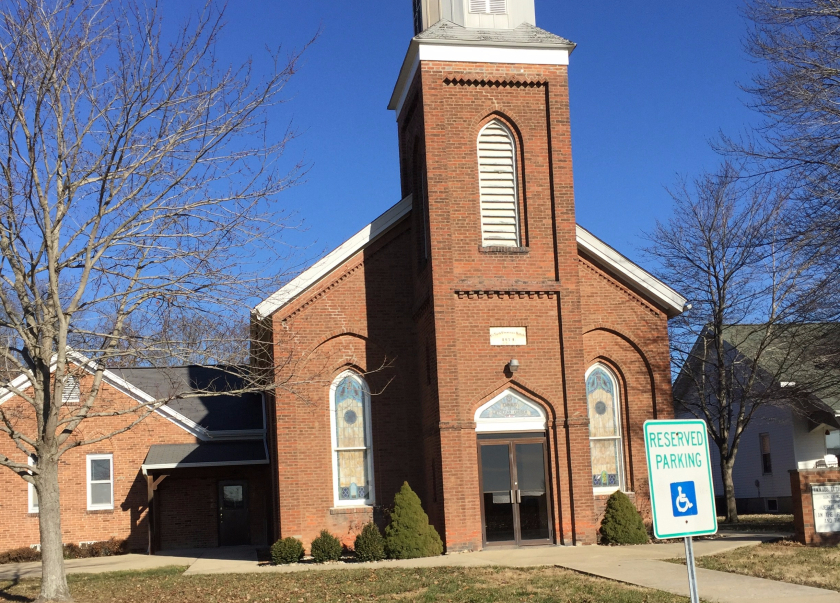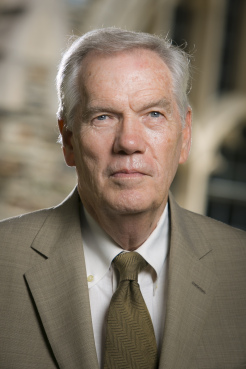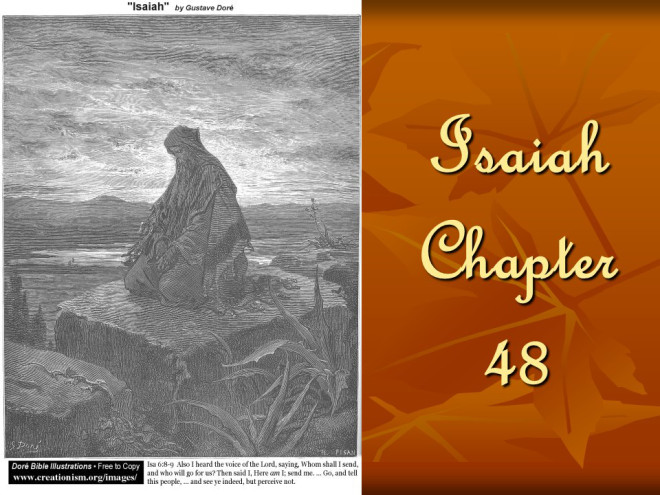 Richard Lischer’s “New Cana Lutheran Church” as of December 2016
Richard Lischer’s “New Cana Lutheran Church” as of December 2016
Open Secrets
Richard Lischer
Broadway Books, 2001. 239 pp.
In December of 2016, my wife and I drove “[out] of Upper Alton… up a state road…” in our 2009 Chevy Malibu. We had been visiting families for our first Christmas with our son (Theodore) — hers in Godfrey and Collinsville, mine in Gillespie — and on that day we had one small pilgrimage, of a kind, to make before we left for our home in Chicago. We were on-the-hunt for “New Cana.”
About a month earlier, one of our pastors gave a message in which she quoted from a moment in the memoir of a Lutheran minister named Richard Lischer. She told how he had entered into his first pastoral appointment, at a small rural church in southern Illinois, with the high aims of using all his theological training to its utmost ability. He sets up, at his first event, a small group discussion for talking about how the church is engaging with their new pastoral appointment; the first (and second) responses are muted, stiff “Well, I didn’t vote for you, but I know we will have a very good church with you as our pastor.” Our pastor weaved this narrative as an example of how we (as American evangelicals especially) often think of ministry strategies before thinking of the people we aim to serve.
But, if I’m an honest parishioner, I was a little distracted by her description of Lischer himself. A memoir about a pastor in small-town Illinois? As a son of small-town Illinois who had married a daughter of small-town Illinois, and as a person who had recently received a call to pastoral ministry, I knew that this was one of those books I would need to borrow. While walking to lunch after church, I grew curious: I wonder where in small-town Illinois Lischer preached? Then I read the opening chapter via an Amazon preview and saw the above quote of him driving north out of Alton (where my wife and I had lived our first year of marriage) into the country. Immediately, I began comparing Lischer’s words with my mental map of Madison and Macoupin Counties (which is, if I say so myself, pretty accurate), and soon I had narrowed down the location of his “New Cana” parish to a small sub-region of the north-of-Alton, east-of-Jerseyville region.
It was in this context, that my wife and I ended up outside of “New Cana” Lutheran Church, the world of Lischer’s memoir Open Secrets.
Our pilgrimage itself was not precisely “exciting.” After all, we are long-time Madison-Macoupin County residents who have only recently made residence as urbanites in Chicago.
 Open Secrets‘ 2001 cover; the “small town” pictured here is far too populated to be “New Cana”
Open Secrets‘ 2001 cover; the “small town” pictured here is far too populated to be “New Cana”
We have been lost in the middle of a cornfield many-a-time before. And “New Cana” Lutheran Church is literally “lost in the middle of a cornfield,” in a way that was utterly familiar to us. Hannah ended up taking one of her better photographs of the church (as my photograph, above, is, characteristically, angled and unprofessional) and using her graphic design wizardry to produce a better book cover, since the edition we had clearly represented a “small town” on the Atlantic seaboard, not southern Illinois. Our small “Lischer-circle” at church (which was us, our pastor Tiffany, and our local Hauerwasian theologian Kevin) were ecstatic about such an update. But the church itself, however mythic as told by Lischer, was no surprise to us. It was, in many ways, a part of us already. The stories that Lischer tells in his memoir could have just as easily been some of the stories my grandmother tells me about growing up on a farm in Shipman. Actually, I’m not entirely sure that somewhere in her family there wasn’t some offshoot that married into or joined the “New Cana” Dullmanns and Bufords and Semanns at some juncture. I’ll have to investigate the Caveny family line at some juncture.
But we didn’t pilgrimage to the “New Cana” church for the sake of excitement. Rather, I think we pilgrimaged there for a sense of “home.” In December, it was becoming ever-clear to me and Hannah that we longed to return “home,” to “our world.” Our inability to see the sunset or sunrise in Chicago was wearing on us; our distance from family was difficult for us; and our new “city-like” busyness was, honestly, “not our thing.” So, however blessed and joyful our time in Chicago had been, we visited “New Cana” with the strong sense that someday soon we would live again in this world. Our world. And in the same sense, we didn’t read Lischer’s memoir to view, as though visitors at a zoo, a “different culture and society,” but, in part, to learn again and learn anew our own home.
Lischer’s pastoral observations are some of the most profound on the topic that I have ever read.
 Richard Lischer is a Professor Emeritus of Preaching at Duke Divinity School
Richard Lischer is a Professor Emeritus of Preaching at Duke Divinity School
Instead of confronting, as most theological-praxis books tend to do, us with theological controversies in the church or practical concerns about preaching or leading Bible studies, Lischer addresses the real “meat” of pastoral work: arguing with the cemetery committee about an unnecessary expense that would overburden a poor widow, learning how to receive a beer offered by a parishioner when the subtexts of the convention are concealed, attempting (unsuccessfully) to “be tough” while half the church watches a pig be butchered prior to dinner. Or, more difficult, wrestling with how to effectively marry a passionate couple with no sense of responsibility or commitment, baptizing an infant that will surely die, consoling a mother whose only son fell in the pond and drowned, or taking a young man to the Cardinals game in the wake of him both losing his father (to a heart attack) and his pastor (to a job-move).The book is a holy excursion into the work of pastoral ministry, and one that expounds on a far more interesting (and far more important) layer to how one thinks of “pastoring.” Too often in American Christianity, the “pastor” is really seen as a “preacher-teacher,” whose “ministry” is all words, words, words; theology without any weighty living behind it. In some sense, Lischer also had this preconception upon arriving at “New Cana.” But Open Secrets divulges a different kind of pastoral ministry, a different aim of a philosophy-of-pastoring, that is desperately needed in our day. Ministry, in Lischer’s memoir, does not occur primarily in the pulpit but at fences, post offices, hospitals, and garages. And, yet, (and this is crucial) it is not the flimsy thing that happens when a person smacks the word “ministry” on top of something else (“Brother, I feel called to do a cassette tape-to-CD transfer ministry,” etc.). Lischer’s ministry is something holy, that manifests the divine in the day-to-day. It is Sacramental, perhaps in its purest form.
Lischer’s insights on rural thought are also extraordinarily valuable. He uncovers the concept of “Gossip” as a form of knowledge (even, I think, an epistemology), and considers how he, as a pastor, can use that “Gossip” for the sake of God’s Kingdom. He reveals the power-structures of committees and sub-committees, of the elders versus the cemetery committee. He observes the tensions of interfering with abusive families, wrestles with his own methods of accomplishing what he feels is right, and, more often than not, discovers that he does not understand how this German farming community actually communicates. If anything, Lischer’s “outsider” view of downstate Illinois rural life helps one to consider any number of “outsider”-“insider” dynamics within churches; and, furthermore, underscores the need to observe traditions and values before moving too quickly in changing them.
If Hillbilly Elegy reminded me of the rural world “falling apart” (as I’ve written about before), then Open Secrets encourages me about all the good of rural communities, all the possibility that exist in them, and all the tensions that come with doing effective Christian ministry in that context. In the time since Hannah and I made our pilgrimage to “New Cana,” we have been considering a pastoral opportunity at a church in small-town Illinois. It isn’t a job offer yet — there are, as always, various hurdles to jump over — but we have still, nevertheless, been considering the possibility in a way we hadn’t when we first picked up Open Secrets. As we finished reading Lischer’s memoir last night, I think we both felt a strange sense of preparedness for wherever the Lord is taking us. Lischer’s misadventures in “New Cana” have changed us, equipped us, even prophesied to us, of some new adventure of our own.
Advertisements Share this:




